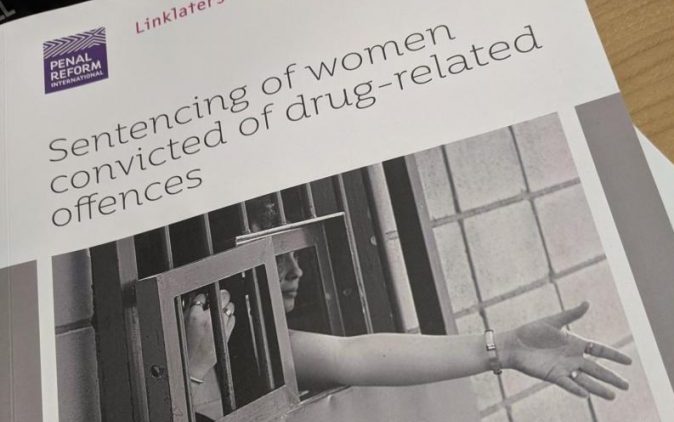This website uses cookies so that we can provide you with the best user experience possible. Cookie information is stored in your browser and performs functions such as recognising you when you return to our website and helping our team to understand which sections of the website you find most interesting and useful.
Vance Center Joins Incarceration Conference
March 2020
(Cover of global report discussed during the Conference | Photo Credit: Marie-Claude Jean-Baptiste)
At the invitation of Penal Reform International, Vance Center Programs Director Marie-Claude Jean-Baptiste, participated in an expert meeting in London on the sentencing of women convicted of drug-related offenses. The meeting, convened in collaboration with the International Drug Policy Consortium (IDPC), brought together experts and practitioners from national and international organizations, civil society, and academia to exchange views on how sentencing for drug offences could be gender-sensitive.
Jean-Baptiste and the other experts discussed the findings of a global report that Linklaters did for PRI assessing how 18 jurisdictions sentence women for drug-related offences. The experts identified key policy gaps and made corresponding recommendations to inform the contents of an international advocacy tool that will provide support to legislators, sentencing authorities, and other criminal justice decision-makers.
Jean-Baptiste moderated a breakout session on the sentencing of women for drug trafficking offenses which focused on the neglect of mitigating factors, such as violence or abuse that women caught trafficking drugs may have suffered, and the difficulty in proving mitigating circumstances. It was also remarked that in many places judges are reluctant to implement alternatives to incarceration, often due to fear of public opinion.
Women who traffic drugs are mostly drug mules at the bottom of the trafficking chains. Harsh sentences for women are thus disproportionate to their role in trafficking and do nothing to break the drug cartels, as these women are easily replaced. Deterrence policies, including harsh mandatory sentencing, do not work to reduce drug trafficking. Women arrested for drug trafficking, mostly foreigners, usually lack access to legal representation.
The group in the breakout session recommended 1) an end to mandatory sentencing for drug offenses; 2) bias training for judges; 3) gender mainstreaming in the criminal justice system; 3) increased focus on the rights of children of women sentenced for drug offenses; and 4) more research into women’s economic exclusion, which often leads to their involvement in drug trafficking.
The Vance Center’s Human Rights Program is pursuing a three-year project to promote global collaboration on improving conditions of women’s imprisonment. The Women in Prison Project convenes women prisoners’ rights advocates from the Americas, Africa, and Asia to 1) share information about conditions of women’s imprisonment in their respective countries or regions; and 2) build capacity for improved monitoring and reporting of conditions in women’s prisons.
Examples of our initiatives under the Women in Prison Project include:
- The International Conference on Women’s Incarceration in Bogota, Colombia, which brought together 49 advocates from 23 countries, including nine formerly incarcerated women.
- A joint research project in Sierra Leone on women’s incarceration, along with the NGO Advocaid, which assesses the causes and consequences of women’s imprisonment in that country and serves as a blueprint for similar research that other organizations can conduct in their respective countries.
- A report “Women in Prison: Africa Regional Initiative” which was developed in collaboration with NGOs and law firms in Nigeria, The Gambia, Malawi, Kenya and Tanzania. The report surveys what is currently known about women’s incarceration in these five African countries, both in law and in practice. It provides a detailed analysis of these countries’ compliance with domestic, regional, and international standards on women’s incarceration.


